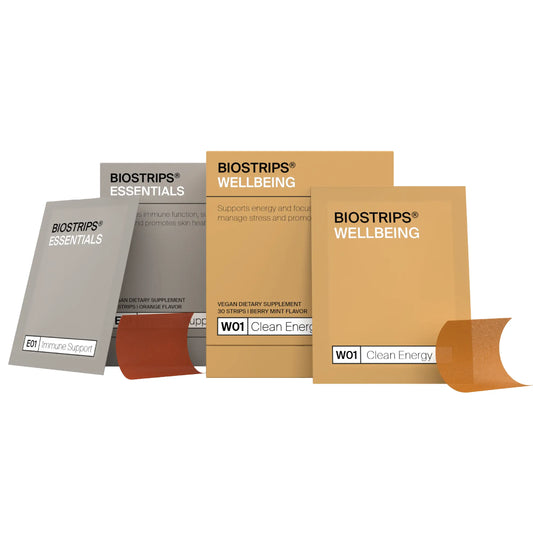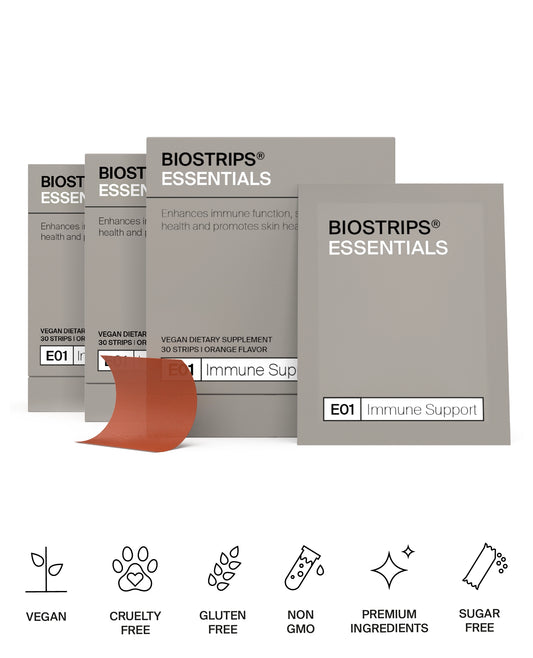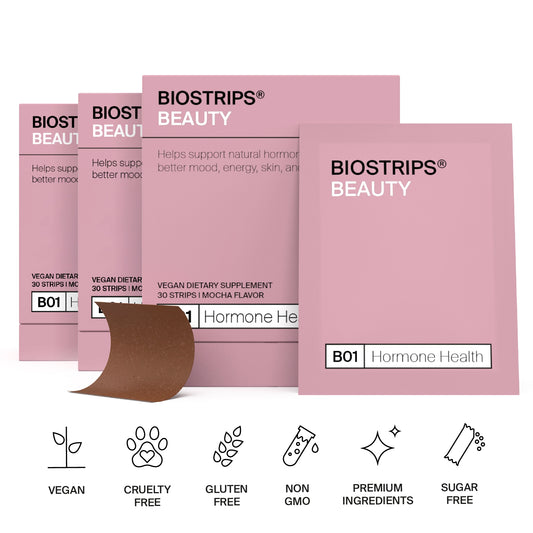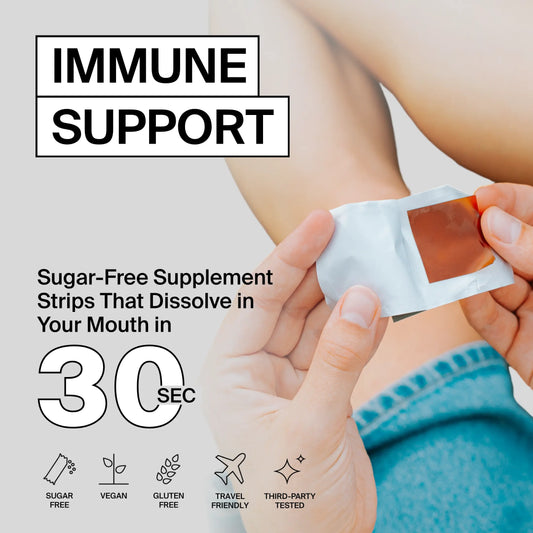Your skin tells a story—a story of what you eat, how you live, and the choices you make. But with the overwhelming amount of skincare advice online, how do you separate fact from fiction? The truth is, misinformation and flashy marketing often leave consumers spending money on quick fixes that fail to deliver real results. This guide is here to support you on your personal skin journey.
Skin health isn’t just about slathering on expensive creams or hoping for overnight miracles. It’s about addressing the root causes—diet, environment, and lifestyle—and making science-backed, informed decisions that lead to sustainable, radiant skin.
At BIOSTRIPS, we believe that consumers deserve better. That’s why each tip in this guide is backed by approved studies, credible research, or expert insights to help you cut through the noise and take meaningful action. Drawing on the expertise of Joanna Bacchus, a leading voice in holistic wellness and skin health, this guide focuses on real solutions—not marketing gimmicks.
Whether you’re tired of battling breakouts, managing dullness, or chasing that elusive glow, this guide offers clear, actionable steps to help you take control. Let’s ditch the myths, confront the causes, and start a new chapter in your skin health journey.
1. Build a Skin-Nourishing Diet
A balanced diet rich in antioxidants and omega-3 fatty acids supports healthy, glowing skin. Foods like blueberries, spinach, and citrus are packed with antioxidants that combat free radical damage, reducing signs of aging and inflammation. Omega-3s, found in salmon, walnuts, and flaxseeds, help maintain skin hydration and reduce redness by strengthening the lipid barrier. According to the National Institutes of Health (NIH), a diet high in these nutrients significantly improves skin health and reduces inflammation【NIH Study on Nutrition and Skin Health](https://www.ncbi.nlm.nih.gov/pmc/articles/PMC3583891/)】. Aim to include these foods daily for optimal results.
2. Balance Your Blood Sugar
Unstable blood sugar levels contribute to inflammation and skin issues, including acne and premature aging. Opt for low-glycemic foods like whole grains, legumes, and leafy vegetables to prevent insulin spikes, which can trigger excess oil production and inflammation. Avoid refined sugars and processed snacks, which accelerate collagen breakdown through glycation. The American Academy of Dermatology (AAD) states that low-glycemic diets improve acne by reducing skin oiliness and inflammation【AAD - Low Glycemic Diet Benefits](https://www.aad.org/public/diseases/acne/causes/food-and-acne)】. Consistency in blood sugar management is key to maintaining clear, radiant skin.
3. Stay Hydrated
Proper hydration is essential for maintaining skin elasticity and preventing dryness. Drinking 2–3 liters of water daily helps flush toxins and supports skin cell function. Additionally, water-rich foods like cucumbers and watermelon provide hydration and essential vitamins. The Centers for Disease Control and Prevention (CDC) emphasizes that adequate water intake improves overall skin health and appearance【CDC - Water and Hydration](https://www.cdc.gov/healthyweight/healthy_eating/water-and-healthier-drinks.html)】. Make hydration a daily habit to keep your skin plump and youthful.
4. Protect Your Skin Microbiome
Your skin microbiome—a collection of beneficial bacteria—plays a vital role in protecting against inflammation and environmental damage. Support it by consuming fermented foods like kimchi, yogurt, or sauerkraut, which provide probiotics that promote gut and skin health. Avoid harsh soaps and cleansers, as they can strip your skin’s natural protective barrier. According to the National Institute of Allergy and Infectious Diseases (NIAID), a balanced microbiome reduces redness, dryness, and acne【NIAID - Skin Microbiome Study](https://www.niaid.nih.gov/research/microbiome)】. Choose gentle, pH-balanced skincare products to maintain a healthy microbiome.
5. Embrace Seasonal Eating
Eating fresh, seasonal produce ensures your body receives a wide range of phytonutrients that benefit your skin. For instance, summer berries are rich in antioxidants, while winter squashes provide beta-carotene for skin repair. Seasonal diets also align with environmental rhythms, which some studies suggest may enhance nutrient absorption. The US Department of Agriculture (USDA) advocates for seasonal eating to maximize nutrient intake and reduce reliance on processed foods【USDA - Seasonal Eating Guide](https://www.nutrition.gov/topics/shopping-cooking-and-food-safety/seasonal-produce)】. Rotate your produce choices throughout the year to support skin health holistically.
6. Prioritize Sleep
Sleep is your skin’s natural repair time. During deep sleep, your body produces collagen, which keeps your skin firm and reduces fine lines. Sleep deprivation, on the other hand, increases cortisol levels, leading to inflammation and breakouts. Aim for 7–9 hours of quality sleep each night and consider using a silk or bamboo pillowcase to reduce friction and prevent wrinkles. The National Sleep Foundation confirms that consistent sleep promotes healthy skin and reduces signs of aging【National Sleep Foundation - Sleep and Skin Health](https://www.sleepfoundation.org/physical-health/how-sleep-affects-skin)】. Incorporate sleep hygiene habits like dimming lights and reducing screen time before bed to improve sleep quality.
7. Shield Yourself from UV Rays
Protecting your skin from UV rays is essential to prevent premature aging, sunspots, and even skin cancer. Apply a broad-spectrum SPF 30+ sunscreen daily, regardless of weather, and reapply every two hours when exposed to the sun. Additionally, consuming beta-carotene-rich foods like carrots, sweet potatoes, and bell peppers can enhance your skin’s natural defense against UV damage. The Skin Cancer Foundation underscores the importance of sunscreen and diet in protecting your skin【Skin Cancer Foundation - UV Protection Tips](https://www.skincancer.org/skin-cancer-prevention/)】. Pair sunscreen with a wide-brimmed hat or sunglasses for added protection.
8. Address Inflammation Holistically
Inflammation can lead to redness, breakouts, and premature aging, but it can be managed with the right lifestyle and dietary choices. Incorporate anti-inflammatory spices like turmeric and ginger into your meals. Turmeric contains curcumin, which has been shown to reduce inflammation and improve skin elasticity, while ginger helps combat oxidative stress. Stress management is equally important; practices such as meditation, yoga, or even a 10-minute daily walk can lower cortisol levels, a stress hormone that exacerbates skin inflammation. The National Center for Complementary and Integrative Health (NCCIH) highlights the anti-inflammatory effects of turmeric and ginger and the importance of stress reduction for overall health【NCCIH - Anti-Inflammatory Remedies](https://www.nccih.nih.gov/health/turmeric)】【NCCIH - Stress and Health](https://www.nccih.nih.gov/health/stress)】.
9. Incorporate Key Micronutrients
Micronutrients are vital for maintaining strong, resilient skin. Zinc, found in pumpkin seeds and lentils, aids in wound healing and reduces inflammation. Selenium, abundant in Brazil nuts, protects against oxidative damage caused by UV exposure. Vitamin D, often synthesized through safe sun exposure, supports skin cell growth and repair. The Office of Dietary Supplements (ODS) notes that deficiencies in these nutrients can lead to compromised skin health and chronic inflammation【ODS - Zinc Fact Sheet](https://ods.od.nih.gov/factsheets/Zinc-Consumer/)】【ODS - Selenium Fact Sheet](https://ods.od.nih.gov/factsheets/Selenium-Consumer/)】【ODS - Vitamin D Fact Sheet](https://ods.od.nih.gov/factsheets/VitaminD-Consumer/)】. Incorporate these nutrients daily through food or supplements as recommended by your healthcare provider.
10. Love Your Liver
Your liver plays a crucial role in detoxifying your body, which in turn impacts your skin health. Cruciferous vegetables like broccoli, kale, and Brussels sprouts support liver detoxification and help eliminate toxins that may cause skin irritation or dullness. These vegetables are rich in glucosinolates, which stimulate liver enzymes to break down harmful substances. According to the National Institute of Environmental Health Sciences (NIEHS), a healthy liver contributes significantly to skin clarity and overall well-being【NIEHS - Detoxification and Liver Health](https://www.niehs.nih.gov/health/topics/conditions/liver/index.cfm)】. Make cruciferous veggies a regular part of your diet to keep your liver functioning optimally.
11. Optimize Hormonal Balance
Hormonal imbalances can lead to acne, oiliness, and dryness. Incorporate hormone-supporting foods such as flaxseeds, chia seeds, and leafy greens into your diet. These foods are rich in phytoestrogens and essential nutrients that help balance hormones naturally. Avoid processed foods and excessive caffeine, as they can disrupt hormonal stability. The Endocrine Society explains that a balanced diet rich in whole foods supports hormonal health and reduces symptoms of imbalance【Endocrine Society - Hormonal Health and Diet](https://www.endocrine.org/)】. Small dietary changes can have a profound impact on both your skin and overall health.
12. Maintain a Consistent Routine
Consistency is key to achieving and maintaining healthy skin. Wash your face twice daily using a gentle, pH-balanced cleanser to remove dirt and excess oil without stripping your skin barrier. Avoid over-exfoliation, as it can lead to irritation and weaken the protective barrier. The American Academy of Dermatology (AAD) emphasizes that a consistent routine with appropriate products is essential for long-term skin health【AAD - Skincare Tips](https://www.aad.org/public/everyday-care/skin-care-basics/care)】. Focus on a simple yet effective regimen tailored to your skin type.
13. Choose Quality Over Quantity
Investing in a few high-quality skincare products with science-backed ingredients is more effective than buying into every skincare trend. Look for formulations with active ingredients like niacinamide, hyaluronic acid, and ceramides, which are proven to improve hydration, reduce redness, and restore the skin barrier. Avoid products with unnecessary fillers or fragrances that may irritate sensitive skin. The U.S. Food and Drug Administration (FDA) advises consumers to prioritize products with transparent labeling and proven efficacy【FDA - Skincare Product Safety](https://www.fda.gov/cosmetics/cosmetic-products)】. Let your choices be guided by quality and research, not marketing hype.
14. Exercise for Circulation
Exercise boosts blood circulation, delivering oxygen and nutrients to your skin cells, which helps repair damage and enhance your natural glow. Cardio exercises, such as running or cycling, and yoga, which reduces stress, are excellent options. Post-exercise, cleanse your face to prevent sweat from clogging pores. According to the American Heart Association (AHA), regular physical activity not only benefits your overall health but also improves skin tone and texture【AHA - Exercise and Circulation](https://www.heart.org/)】. Incorporate movement into your daily routine to support both skin and systemic health.
15. Stay Mindful of Stress
Chronic stress disrupts your body's hormonal balance, exacerbating skin conditions like acne, eczema, and psoriasis. Elevated cortisol levels can lead to increased oil production and inflammation, directly impacting skin health. To combat this, practice mindfulness techniques such as meditation, deep breathing, or journaling. These activities help lower cortisol and promote relaxation. A study by the American Psychological Association (APA) highlights the role of mindfulness in reducing stress and improving skin conditions associated with inflammation【APA - Mindfulness and Stress Reduction](https://www.apa.org/topics/mindfulness)】. Incorporate these practices daily to achieve a calmer, clearer complexion.
16. Be Smart About Makeup
Your makeup habits significantly impact your skin's health. Use non-comedogenic products that are formulated to avoid clogging pores and reduce the risk of breakouts. Always remove makeup thoroughly before bed, as leaving it on overnight can block pores and trap bacteria. Regularly clean and replace makeup brushes and sponges to prevent bacterial buildup, which can lead to irritation and infection. According to the American Academy of Dermatology (AAD), proper makeup hygiene is essential for maintaining healthy, blemish-free skin【AAD - Makeup and Skin Health](https://www.aad.org/public/everyday-care/skin-care-basics/care/makeup)】.
17. Strengthen Your Skin Barrier
The skin barrier is essential for protecting against environmental aggressors and retaining moisture. To strengthen it, use moisturizers with ceramides and hyaluronic acid, which help replenish the skin's natural lipids and improve hydration. Avoid overly hot showers, as they strip the skin of its natural oils, leaving it dry and vulnerable. The National Eczema Association (NEA) recommends lukewarm water and gentle, fragrance-free moisturizers to support a healthy skin barrier【NEA - Skin Barrier and Moisturizing Tips](https://nationaleczema.org/eczema/treatment/moisturizing/)】. Regular care helps maintain a resilient and balanced skin barrier.
18. Include Superfoods for Skin
Superfoods like green tea, avocados, and chia seeds provide essential nutrients that support healthy, glowing skin. Green tea contains polyphenols with anti-inflammatory and antioxidant properties, reducing redness and protecting against sun damage. Avocados are rich in healthy fats and Vitamin E, which hydrate and repair the skin. Chia seeds provide omega-3 fatty acids, essential for maintaining the skin’s lipid barrier. A study published by the National Center for Biotechnology Information (NCBI) highlights the benefits of polyphenol-rich foods for skin health【NCBI - Superfoods and Skin Health](https://www.ncbi.nlm.nih.gov/)】. Including these in your diet can improve your skin's texture and elasticity.
19. Avoid Skin Saboteurs
Certain lifestyle habits can sabotage your skin’s health. Alcohol dehydrates the skin, causing dullness and accelerating the appearance of fine lines. Smoking and secondhand smoke break down collagen and elastin, leading to premature aging and sagging. The Centers for Disease Control and Prevention (CDC) states that smoking cessation significantly improves skin elasticity and reduces wrinkles over time【CDC - Smoking and Skin Health](https://www.cdc.gov/)】. Moderating alcohol consumption and avoiding smoking are crucial steps in maintaining youthful, resilient skin.
20. Boost Your Collagen Naturally
Collagen is a key protein for maintaining skin’s firmness and elasticity. Enhance collagen production by consuming Vitamin C-rich foods like citrus fruits, bell peppers, and strawberries, which aid in collagen synthesis. Bone broth provides natural collagen, while plant-based options like spirulina and kale offer amino acids that support collagen production. Avoid excessive sugar, which damages collagen through a process called glycation. A publication by the Harvard T.H. Chan School of Public Health emphasizes the role of diet in maintaining collagen and skin health【Harvard T.H. Chan - Diet and Skin Health](https://www.hsph.harvard.edu/)】.
21. Focus on Your Gut
Your gut health is closely linked to your skin’s appearance through the gut-skin axis. Incorporate prebiotics such as garlic, bananas, and oats into your diet to nourish beneficial gut bacteria. Fermented foods like yogurt and kimchi provide probiotics that help balance the microbiome, reducing inflammation and skin issues like acne. Address food intolerances that may trigger systemic inflammation, which often manifests as breakouts or redness. The National Institutes of Health (NIH) confirms the connection between gut health and skin conditions, advocating for a diet rich in prebiotics and probiotics【NIH - Gut and Skin Health](https://www.ncbi.nlm.nih.gov/)】.
22. Diversify Your Plate
A diverse diet is essential for achieving optimal skin health. Incorporate a rainbow of vegetables and fruits into your meals to ensure you receive a wide range of vitamins, minerals, and antioxidants. For instance, red fruits like tomatoes provide lycopene for UV protection, while green vegetables like spinach offer iron and folate for skin repair. Pair these with healthy fats, such as olive oil or avocados, to enhance the absorption of fat-soluble vitamins like A, D, E, and K. The U.S. Department of Agriculture (USDA) recommends consuming a variety of colorful produce to support overall health and skin vitality【USDA - MyPlate Guidance](https://www.myplate.gov/)】.
23. Care for Sensitive Skin
Sensitive skin requires extra caution to prevent irritation. Always use fragrance-free, hypoallergenic products designed for sensitive skin types to minimize the risk of allergic reactions. Before applying a new product to your entire face, perform a patch test by applying a small amount to your inner arm and waiting 24–48 hours for any reaction. The American Academy of Dermatology (AAD) emphasizes that this simple step can prevent adverse reactions and long-term skin damage【AAD - Skincare for Sensitive Skin](https://www.aad.org/)】.
24. Let Your Skin Breathe
Heavy makeup can clog pores and lead to breakouts, especially when worn daily without proper removal. Allow your skin to "breathe" by taking makeup-free days and focusing on a minimalist skincare routine. High-quality, multitasking products with clean ingredients can simplify your regimen while delivering effective results. The National Institute of Environmental Health Sciences (NIEHS) advises against prolonged use of occlusive makeup to prevent skin irritation and blocked pores【NIEHS - Skincare and Health](https://www.niehs.nih.gov/)】.
25. Invest in Antioxidants
Antioxidants are powerful allies in protecting your skin against free radical damage caused by pollution and UV rays. Look for products containing Vitamin C, Vitamin E, and ferulic acid, which work synergistically to neutralize free radicals and improve skin texture. Complement topical treatments with antioxidant-rich foods such as blueberries, nuts, and dark leafy greens. The National Institutes of Health (NIH) highlights the role of antioxidants in reducing oxidative stress and supporting skin health【NIH - Antioxidants Fact Sheet](https://ods.od.nih.gov/)】.
26. Address Climate Challenges
Your skincare routine should evolve with the seasons. Use heavier moisturizers during winter to combat dry air and lighter, non-greasy formulations in summer to avoid clogged pores. Environmental factors like humidity and temperature shifts impact skin hydration levels and oil production. According to the American Academy of Dermatology (AAD), adapting your skincare products to climate changes is crucial for maintaining balance and protection【AAD - Seasonal Skincare Tips](https://www.aad.org/)】.
27. Keep it Clean
Hygiene plays a significant role in preventing skin issues. Wash your pillowcases and towels at least weekly to avoid bacteria buildup that can transfer to your skin. Additionally, clean your phone screen daily, as it can harbor germs and oils that contribute to acne. The Centers for Disease Control and Prevention (CDC) advises regular cleaning of high-contact surfaces to maintain both skin and overall health【CDC - Cleaning and Hygiene Practices](https://www.cdc.gov/)】.
28. Avoid Overdoing DIY Remedies
While natural remedies can be beneficial, not all are skin-safe. Avoid harsh acidic ingredients like lemon juice, which can disrupt your skin’s pH balance and cause irritation or burns. Instead, opt for tried-and-true natural remedies, such as oatmeal masks, known for their soothing and anti-inflammatory properties. The National Center for Complementary and Integrative Health (NCCIH) recommends consulting evidence-based guidelines before trying DIY skincare treatments【NCCIH - Natural Products](https://www.nccih.nih.gov/)】.
29. Celebrate Progress, Not Perfection
Achieving healthy skin is a journey, not a race. Celebrate small milestones, like reduced redness or an improvement in texture, rather than striving for unattainable perfection. Focus on building sustainable habits that align with your skin’s needs and prioritize long-term health over instant results. The American Psychological Association (APA) stresses the importance of self-acceptance and patience in achieving personal goals, including skincare【APA - Building Healthy Habits](https://www.apa.org/)】.















